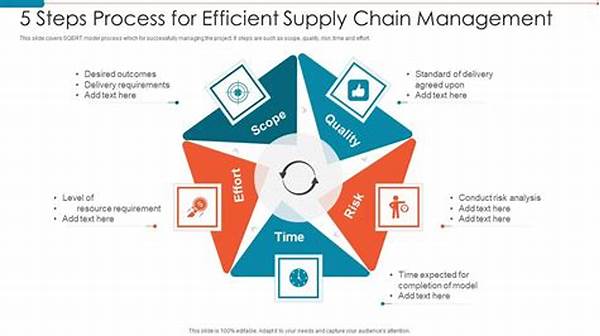In today’s fast-paced and ever-evolving business landscape, efficient supply chain management plays a pivotal role in ensuring the success and sustainability of companies across various industries. By seamlessly integrating operations, fostering strong partnerships, and leveraging technology, businesses can enhance productivity, reduce costs, and ultimately deliver superior value to customers. Understanding the importance and implementation of efficient supply chain management is critical for companies aiming to thrive in competitiveness and achieve long-term growth.
The Importance of Efficient Supply Chain Management
Efficient supply chain management is not just a buzzword; it is a vital component of a successful business strategy. By streamlining processes and optimizing resources, companies can reduce operational costs and improve their bottom line. For instance, effective inventory management ensures that businesses have the right products at the right time, minimizing the risk of overstocking or stockouts. Efficient supply chain management also promotes collaboration between suppliers, manufacturers, and distributors, leading to improved communication and coordination. This collaboration can result in shorter lead times, improved product quality, and enhanced customer satisfaction.
Moreover, efficient supply chain management is crucial for meeting customer expectations in an increasingly demanding market. With consumers expecting faster delivery times and greater product availability, businesses need to be agile and responsive. By implementing efficient supply chain practices, companies can respond swiftly to market changes and customer demands, providing a competitive edge. Additionally, sustainable supply chain practices, such as reducing carbon footprints, further align businesses with the growing consumer demand for environmentally responsible companies.
Benefits of Efficient Supply Chain Management
1. Cost Reduction: Efficient supply chain management enables companies to cut costs through streamlined operations and waste reduction.
2. Improved Customer Satisfaction: By ensuring timely delivery and product availability, customer satisfaction is significantly enhanced.
3. Better Risk Management: Companies can anticipate potential disruptions and implement contingency plans to mitigate risks.
4. Increased Agility: Businesses can quickly adapt to changes in demand and market conditions, ensuring operational resilience.
5. Enhanced Supplier Relations: Strong collaboration with suppliers fosters trust and leads to improved efficiency and innovation.
Strategies for Efficient Supply Chain Management
Efficient supply chain management involves several strategic initiatives. One effective approach is leveraging technology to enhance visibility and data-driven decision-making. Advanced systems such as Enterprise Resource Planning (ERP) and Supply Chain Management (SCM) software provide real-time insights, helping companies optimize inventory levels, supplier performance, and logistics operations. Additionally, companies should focus on fostering strong partnerships with suppliers and logistics providers. Building collaborative relationships can lead to mutual benefits, such as shared risk and improved innovation.
Implementing lean practices is another strategy for achieving efficient supply chain management. By eliminating waste and focusing on value-added activities, businesses can enhance productivity and reduce costs. This can involve adopting just-in-time production, continuous improvement processes, and embracing automation. An organization-wide commitment to efficiency and innovation is crucial for maintaining a competitive edge. Efficient supply chain management also necessitates the ongoing training and development of employees to ensure they are equipped with the latest skills and knowledge needed to thrive in their roles.
Key Aspects of Efficient Supply Chain Management
1. Transparency: Ensuring visibility across the supply chain to allow for timely decision-making and issue resolution.
2. Integration: Seamless integration of processes and information flow between different stakeholders is essential.
3. Responsiveness: Ability to react promptly to changes in demand or supply conditions.
4. Sustainability: Incorporating environmentally friendly practices in supply chain operations to meet regulatory and consumer expectations.
5. Technology Utilization: Adopting modern technologies to enhance efficiency and data accuracy within the supply chain.
Challenges in Efficient Supply Chain Management
Despite its many benefits, achieving efficient supply chain management poses several challenges. Adapting to rapid technological advancements requires significant investment and change management efforts. Companies may encounter resistance to adopting new practices or technologies, hindering efficiency improvements. Global supply chains also face logistical challenges, such as fluctuating fuel prices, regulatory changes, and geopolitical instability. Navigating these complexities requires continuous monitoring and a strategic approach. Lastly, fostering effective communication and collaboration among diverse global teams can be demanding, especially in ensuring alignment across different cultures and languages.
Nevertheless, overcoming these challenges is vital for companies seeking to excel in efficient supply chain management. Organizations must foster a culture of innovation, adaptability, and resilience to navigate the complexities and remain competitive in a dynamic global marketplace.
Future Trends in Efficient Supply Chain Management
Looking ahead, the landscape of efficient supply chain management is set to evolve with emerging trends and technologies. The adoption of artificial intelligence (AI) and machine learning (ML) will play a significant role in optimizing supply chain operations by providing predictive analytics and demand forecasting. Additionally, sustainable supply chain practices will continue to gain importance, with companies focusing on minimizing environmental impacts and embracing circular economy principles.
Blockchain technology is poised to enhance transparency and traceability within the supply chain, offering enhanced security and trust among stakeholders. Furthermore, the rise of e-commerce and omni-channel retailing will drive companies to continuously innovate their supply chain strategies to meet the evolving expectations of digital-savvy consumers. By keeping a keen eye on these trends and embracing the potential of new technologies, businesses can ensure that their supply chains remain efficient, competitive, and prepared for the future.
